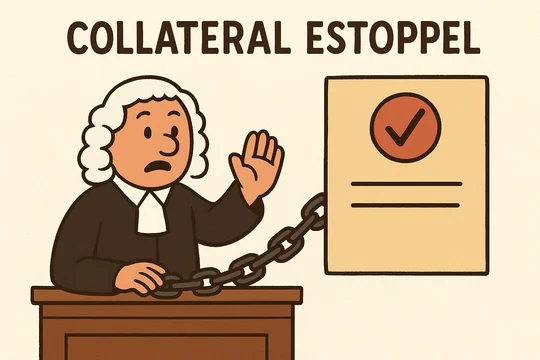As our AI overloads approach a dark singularity, I occasionally amuse myself by asking it increasingly obtuse questions just to see what it spits out. Today, for instance, I asked it for a cartoon depicting the abstract legal concept of collateral estoppel:

I'm not entirely sure the old fella hit the mark on this one, but I'm honestly not sure what I would come with that's any better. Another draw on the Turing test.
Anyway...
Judge Hall issued an interesting opinion on last week on collateral estoppel. The plaintiff in Ingenus Pharms., LLC v. Hetero USA, Inc., C.A. No. 24-1025-JLH (D. Del. Oct. 21, 2025), had several suits pending in different districts regarding the same patent. Whilst the Delaware case was just puttering along, the Court in Illinois found the asserted patent indefinite and issued judgment accordingly. Ingenus promptly moved to stay the Delaware case pending the appeal.
The defendant, however, was having none of it and instead moved for summary judgment that plaintiff's claims were barred by collateral estoppel. Plaintiff responded that the judgment in the other case was not final because:
(i) the Nexus Court “relied on the papers and did not hear evidence or argument;” (ii) the Nexus Court’s “opinion expressed confusion about specific arguments and [Ingenus’s expert evidence];” (iii) Ingenus has appealed the Nexus Court’s ruling; (iv) if this Court grants summary judgment on the basis of collateral estoppel and Hetero launches but the Federal Circuit later reverses the Nexus Court, Ingenus might not be able to recover all of its damages; and (v) the Nexus Court entered judgment for the defendant without giving Ingenus a chance to ask for reargument
Id. at 3 (quoting D.I. 73 at 7-10).
Judge Hall granted the motion finding that the arguments above were really directed towards the issue of whether the Illinois Court got it wrong:
Ingenus next contends that it did not have a full and fair opportunity to litigate the issue of indefiniteness because the Nexus Court “misinterpreted,” “did not understand,” and “misapprehen[ded]” the ʼ952 patent and the science. (For support, Ingenus cites Blonder-Tongue Lab’ys, Inc. v. Univ. of Ill. Found., 402 U.S. 313 (1971), where the Supreme Court said that courts can consider whether the previous court “wholly failed to grasp the technical subject matter and issues in suit.” Subsequent case law, however, has made clear that “a district court’s inquiry into whether the plaintiff was afforded a full and fair opportunity to litigate is quite narrow and does not involve a judgment on the merits.” The record reflects that Ingenus was represented in the prior case by the same counsel as in this case. Ingenus had an opportunity to oppose the prior defendant’s motion for summary judgment of indefiniteness, and the Nexus Court cited to the appropriate legal standards and relevant expert evidence in rendering its decision. There is no basis for this Court to say that Ingenus was not accorded a full and fair opportunity to be heard.
Id. at 4 (internal citations omitted).
If you enjoyed this post, consider subscribing to receive free e-mail updates about new posts.

